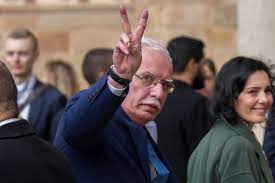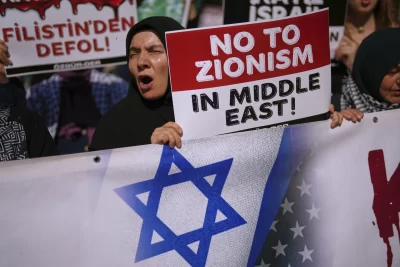
The top Palestinian diplomat made a plea Monday to extend the fragile cease-fire in Gaza, hours ahead of its scheduled expiry, at a meeting of European Union members and Middle Eastern and north African countries that focused on diplomatic efforts to stop the Israel-Hamas war.
“We have to find how to apply the necessary pressure so that the Israeli government does not continue killing innocent people, so that we can continue counting cadavers,” Riad al-Maliki said in Spanish during a news conference during the gathering of diplomats in Barcelona, Spain.
Israel is not attending the meeting hosted by the Union for the Mediterranean and chaired by the EU’s foreign policy chief, Josep Borrell, and Jordanian Foreign Minister Ayman Safadi. Many of the 42 delegations were represented by their foreign ministers.
In recent years, the event has become largely a forum for cooperation between the EU and the Arab world. Monday’s gathering was supposed to focus on the role of the union 15 years after its foundation, but it has taken on new significance since the Oct. 7 Hamas attack that killed more than 1,200 Israelis and led to nearly 240 people being taken hostage and Israel’s ensuing war in the Gaza Strip.
Borrell said he “regretted” the absence of Israel. He repeated his condemnation of the Hamas attack, while calling on Israel to permanently end its assault, which he said has claimed the lives of over 5,000 children.
Jordan’s Safadi, who told The Associated Press on the eve of the event that he hopes the talks will help “bridge a gap” between Arab and European countries, urged the officials attending the meeting to back a two-state solution that would recognize a Palestinian state.
But Safadi also acknowledged Monday after the meeting that despite a broad consensus for peace, there are still some differing viewpoints on how hard to push Israel to stop.
“Today, we came for a very open, very frank, very blunt conversation. We agreed and we disagreed. Some of our colleagues still call the killing of 15,000 Palestinians, the destruction of over 160,000 homes, the complete devastation of hospitals, the denial of food, water, fuel, medicine, is self-defense,” the Jordanian minister said. “We call it blatant aggression.”
Safadi would not say which countries took the softer approach to Israel, but the Czech Republic, Austria, Croatia, and Hungary have insisted on Israel’s right to defend itself.
Saudi Arabia’s foreign minister, Prince Faisal bin Farhan Al Saud, was invited to the event. Israel had been close to normalizing relations with Saudi Arabia before the Hamas attack.
“Continued escalation will produce no severe pain for any party,” Prince Faisal said. “The only sure result is more destruction, radicalization and further conflict at the expense of Palestinian lives, as well as regional security, including that of Israel. Since this crisis erupted, we have been clear on condemning all the targeting of civilians in any form. On both sides.”
Borrell said he wanted the gathering to focus on managing the humanitarian crisis in Gaza once hostilities finally stop. The EU would want the United Nations to take a leading role in establishing how best to fill any security vacuum should Israeli forces defeat Hamas, according to a senior EU official who was not authorized to speak publicly and spoke on condition of anonymity.
Borrell mentioned in his opening remarks that there were Arab partners who “don’t want to talk about the day after in Gaza without having a clear and credible political prospect. That is why we should agree today to work together to build such a political horizon.”
A small pro-Palestinian group rallied before the gathering at the art nouveau building that once housed Barcelona’s Sant Pau Hospital.
German Foreign Minister Annalena Baerbock told reporters Monday that the “fact that Israel has to fear one-sided hostility here and is therefore not taking part today shows how deep the rifts are at the moment.”
“That is precisely why I am here today, even though these meetings were not previously given a high profile by Germany,” she added. “Precisely because the rifts are getting deeper.”
Israel gave no reason for its decision not to attend the gathering.
The pause in hostilities between Israel and Hamas continued Sunday with a third day of releases of hostages and Palestinian prisoners. It was scheduled for four days and neither side has made fully clear what comes after Monday.
Spain is one of the EU countries that has called for Israel to cease its assault, while also condemning the Hamas attack. Spanish Prime Minister Pedro Sánchez said the time has come for the international community and the EU to recognize a Palestinian state, during a trip with his Belgian counterpart to Israel, the Palestinian territories and Egypt last week. That prompted Israel to summon the Belgian and Spanish ambassadors.
Speaking alongside al-Maliki, Spanish Foreign Minister José Albares said that Hamas cannot be part of the solution. Al-Maliki is the foreign minister for the internationally recognized Palestinian Authority, whose forces were driven out of Gaza by Hamas when it seized power in 2007.
The Union for the Mediterranean is an intergovernmental organization formed by the 27 members of the EU and 16 from the southern and eastern Mediterranean including Israel, the Palestinian Authority, Egypt, Lebanon and Jordan.
The EU is the world’s biggest provider of assistance to the Palestinians. Almost 1.2 billion euros ($1.3 billion) has been earmarked for 2021-2024.
The EU is Israel’s biggest trade partner, accounting for 28.8% of its trade in goods last year.
___
Associated Press writers Lorne Cook in Brussels and Kirsten Grieshaber in Berlin contributed to this report. Video-journalist Renata Brito also contributed.
___
This story has been corrected to show that Israel summoned the ambassadors of Spain and Belgium, not that it recalled its ambassadors to those countries.




